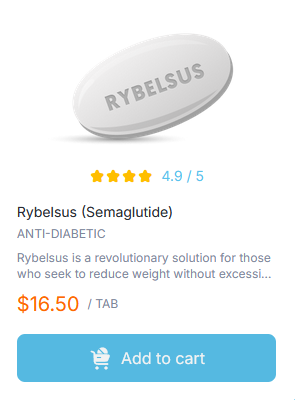Understanding Rybelsus: How It Promotes Weight Loss
Understanding Rybelsus and Its Mechanism for Weight Loss
Rybelsus, a medication primarily used to treat type 2 diabetes, has garnered attention for its potential effects on weight loss. But how does Rybelsus work for weight loss? This article explores the mechanisms behind this medication and its impact on body weight.
What is Rybelsus?
Rybelsus is an oral formulation of semaglutide, a glucagon-like peptide-1 (GLP-1) receptor agonist. It mimics the action of GLP-1, a hormone that plays a crucial role in glucose regulation and appetite control. Originally developed to improve glycemic control in patients with type 2 diabetes, researchers have noted its influence on weight management as well.
Mechanisms of Action
To understand how Rybelsus aids in weight loss, it’s important to examine its various mechanisms:
- Appetite Suppression: Rybelsus increases feelings of fullness by acting on the brain's appetite control centers. This leads to reduced food intake, helping individuals consume fewer calories.
- Slowed Gastric Emptying: The medication slows down the rate at which food leaves the stomach, extending the sensation of satiety and preventing overeating.
- Improved Insulin Sensitivity: By enhancing insulin secretion in response to meals, Rybelsus helps regulate blood sugar levels, which can indirectly influence weight gain and loss.
Clinical Evidence
Studies have shown significant weight loss results among participants using Rybelsus compared to those taking a placebo. In clinical trials, patients reported an average weight reduction ranging from 5% to 10% of their body weight over several months. These findings suggest that Rybelsus not only assists in managing diabetes but also offers considerable benefits for weight loss.
Considerations and Side Effects
While Rybelsus can be effective for weight loss, it is essential to consider potential side effects. Common side effects include nausea, diarrhea, and abdominal pain. Before starting any new medication, individuals should consult with healthcare providers to discuss risks, benefits, and suitability based on their medical history.
Conclusion
In summary, Rybelsus works for weight loss through multiple mechanisms, including appetite suppression and improved metabolic function. For individuals struggling with obesity or weight management, Rybelsus may offer a viable option, especially when combined with dietary changes and physical activity. As always, a personalized approach under medical supervision is crucial for achieving sustainable weight loss.
Mechanism of Rybelsus in Promoting Weight Loss
Understanding Rybelsus and Its Mechanism for Weight Loss
Rybelsus, a prescription medication containing the active ingredient semaglutide, has gained attention for its efficacy in promoting weight loss among individuals with obesity or overweight conditions. But how does Rybelsus work for weight loss? This article delves into the mechanisms through which Rybelsus facilitates weight reduction.
The Role of GLP-1 Receptor Agonists
Rybelsus belongs to a class of drugs known as GLP-1 (glucagon-like peptide-1) receptor agonists. These medications mimic the action of a naturally occurring hormone that plays a crucial role in glucose metabolism and appetite regulation. By activating GLP-1 receptors, Rybelsus influences several physiological processes that contribute to weight loss.
Appetite Suppression
One of the primary ways Rybelsus aids in weight loss is through appetite suppression. When ingested, Rybelsus stimulates the release of insulin while simultaneously inhibiting glucagon secretion. This dual action not only helps regulate blood sugar levels but also signals to the brain that the body has sufficient energy reserves, thereby reducing hunger and food intake.
Delayed Gastric Emptying
Another significant mechanism by which Rybelsus promotes weight loss is its effect on gastric emptying. The medication slows down the rate at which food leaves the stomach, leading to prolonged feelings of fullness after meals. This delayed gastric emptying means that individuals are less likely to overeat, contributing to a calorie deficit essential for weight loss.
Improved Glycemic Control
In addition to its appetite-regulating effects, Rybelsus enhances glycemic control. Improved blood sugar stability prevents the spikes and crashes associated with traditional dietary patterns, reducing cravings for high-calorie foods. As a result, individuals on Rybelsus may find it easier to adhere to healthier eating habits, further supporting their weight loss efforts.
Impact on Fat Storage
Research suggests that Rybelsus may also influence fat storage in the body. By modulating certain hormones involved in lipid metabolism, Rybelsus encourages the body to utilize stored fat as an energy source rather than accumulating new fat. This shift in metabolic pathways can contribute significantly to weight loss and overall improvements in body composition.
Conclusion: A Holistic Approach to Weight Management
In summary, Rybelsus promotes weight loss through a multifaceted approach that includes appetite suppression, delayed gastric emptying, improved glycemic control, and altered fat storage mechanisms. For those wondering how does Rybelsus work for weight loss, the answer lies in its ability to create a sustainable environment conducive to weight management. However, it's important to note that Rybelsus should be used as part of a comprehensive weight loss program that includes dietary changes and physical activity for optimal results.
Mechanism of Action for Weight Loss with Rybelsus
Understanding Rybelsus
Rybelsus, the first oral GLP-1 (glucagon-like peptide-1) receptor agonist, has gained attention for its role in weight management, particularly among individuals with type 2 diabetes. As obesity becomes an increasingly prevalent issue globally, understanding "how does Rybelsus work for weight loss" is essential for those seeking effective solutions.
Mechanism of Action
The mechanism of action of Rybelsus involves several physiological processes that contribute to weight loss:
1. Appetite Regulation
One of the primary ways Rybelsus aids in weight loss is by modulating appetite. By mimicking the effects of GLP-1, Rybelsus enhances feelings of satiety and reduces hunger. This results in lower caloric intake, making it easier for individuals to adhere to their dietary goals.
2. Slowing Gastric Emptying
Rybelsus slows down gastric emptying, which means food stays in the stomach longer. This prolonged presence of food increases satiety and helps individuals feel fuller for longer periods. Consequently, this may lead to reduced snacking and overall calorie consumption throughout the day.
3. Enhancing Insulin Sensitivity
The drug improves insulin sensitivity, which plays a crucial role in glucose metabolism. By enhancing the body's response to insulin, Rybelsus helps regulate blood sugar levels, decreasing the likelihood of insulin spikes that can result in increased hunger and cravings.
4. Impact on Reward Centers
Rybelsus may also influence the brain's reward centers. By affecting neurotransmitters related to pleasure and reward, it can alter how individuals respond to food, potentially reducing the psychological urge to eat or overindulge.
Clinical Evidence
Clinical trials have demonstrated significant weight loss among participants using Rybelsus compared to those taking a placebo. These studies have shown that patients not only lost weight but also improved their glycemic control, leading to better overall health outcomes.
Conclusion
In summary, understanding "how does Rybelsus work for weight loss" reveals a multifaceted approach to managing body weight. Through appetite regulation, slowing gastric emptying, enhancing insulin sensitivity, and influencing brain chemistry, Rybelsus provides a comprehensive solution for those looking to achieve sustainable weight loss. As always, individuals should consult healthcare professionals to determine the best approach for their unique health needs.


